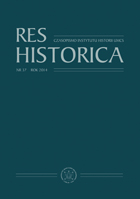Polskie decyzje dotyczące działań wojennych na Froncie Północno-Wschodnim w lipcu 1920 r. i ich wpływ na dalszą karierę wojskową generała broni Stanisława Szeptyckiego. Przyczynek do biografi i generała
Polish Decisions Regarding Military Operations on the North-Eastern Front in July 1920 and Their Impact on the Further Military Career of General Stanisław Szeptycki. A Contribution to the General’s Biography
Author(s): Andrzej WojtaszakSubject(s): Military history, Political history, Social history, Interwar Period (1920 - 1939)
Published by: Wydawnictwo Naukowe Uniwersytetu Marii Curie-Sklodowskiej
Keywords: biography; organization of the Polish Army; Polish-Soviet war; generals of the Polish Army; coup d’état in 1926;
Summary/Abstract: General Stanisław Count Szeptycki belonged to a group of offi cers who began their military career in the Habsburg army during the partitions. He was born in Przyłbice in the Austro-Hungarian partition. He belonged to an aristocratic family with great patriotic and religious commitment. Many representatives of the family were bishops (Greek-Catholic rite) or devoted themselves to military service. He was the grandson of the famous Polish comedy writer Aleksander Fredro. In the Austro-Hungarian army, he reached the rank of major general. During World War I, he joined the Polish Legions, becoming their leader in 1916. In 1917, he became the general governor of the Austro-Hungarian occupation in Lublin. As a sign of protest after the provisions of the Treaty of Brest-Litovsk (February 19, 1918) omitt ing Poland, he resigned. After the war, he joined the Polish Army, taking the position of Chief of the General Staff . He fought in the Polish-Soviet war and was the commander of a division, the 4th Army, and the front of „Gen. Stanisław Szeptycki” and then the North-Eastern Front. After the July Soviet off ensive by M. Tuchaczewski in 1920, due to illness, he was removed from command of the front. As a result of diff erences in the assessment of Polish military activities, he entered into a dispute with Józef Piłsudski. In 1921, he became the commander of the Inspectorate of the Army No. IV in Krakow, and then the minister of military aff airs in the government of Wincenty Witos. Opponent of Józef Piłsudski. In 1926, after the coup, the state retired.
Journal: Res Historica
- Issue Year: 2023
- Issue No: 56
- Page Range: 479-506
- Page Count: 28
- Language: Polish

